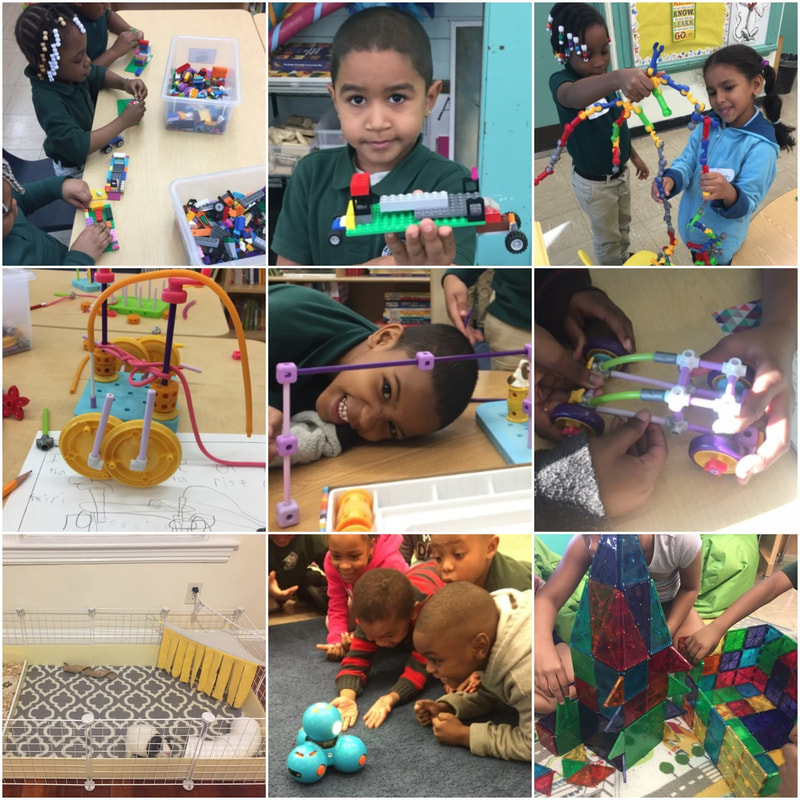and the recipient of a 2018 President's Award.
We will develop authentic learning experiences and facilitate cognitively-demanding tasks that encourage students to explain their thinking through verbal, visual and written expression to improve comprehension and support school readiness.
Making is incredible preparation for how the world works outside the classroom. Students can master problem solving and collaboration. They can establish inclusion, something that is already synonymous with the library. They can learn that failure is not a bad word, but rather that failure is just an opportunity to try again. I can build my students’ skill sets and enhance meaning. According to Leila Meyer, these are the “skills that will serve them throughout their educational and professional lives."
Learning doesn’t just happen. Rather, it’s something you work at. A makerspace has helped my students develop that growth mindset I want them to have, teaching them to push through obstacles and be resilient in the face of failure. I believe that my students need the skills to succeed in a constantly changing world. Robots, computer programming, upcycling, and STEAM building challenges are all engaging ways of learning the essential skills of collaboration, communication, and media literacy. These skills are critical to providing children with opportunities relevant to today's world, and having these resources will help to put my underserved students on a level playing field in the future.
For an example, one of the STEAM challenges in our library makerspace happened when first graders were reading The Three Little Pigs. We had a discussion about how the wolf was able to blow down the straw house and the stick house but not the brick house. My students took it upon themselves to try to build a stronger house that the wolf wouldn’t be able to blow down. They worked together to build their houses and test their constructions, following the engineering design process. It really gave my students a chance to take ownership over their own curriculum. They felt empowered to take charge and make their own decisions. Building and making is a way for some students to know something deeply. I feel so lucky to have the opportunity to ignite a passion in them so they become doctors, architects, scientists and astronomers. Working in an elementary school, I can start this when they are young so they grow up believing that they can and that they have the ability to do so. According to Dale Dougherty, Editor & Publisher of Make Magazine, “By the process of tinkering, we learn how to change and shape the world in small but significant ways and adapt it to our personal needs.” I truly believe that making will open doors of opportunity for all of my students, and hopefully they will have a positive impact on the world.
My advice to those that are thinking of introducing a makerspace to their library would be don’t think that you can’t start small. When I started four years ago, I had just one table and one box of Legos that was shared between hundreds of students. Making doesn’t have to start off big and it doesn’t have to cost a lot. All students really need is a space to collaborate with peers, and a space to think creatively and make something original.
Thinking about starting a makerspace? Check out Makerspaces: A Practical Guide for Librarians by John Burke and Ellyssa Kroski.
“Coursera Week 3 Pedagogical Perspective: Edith Ackermann.” Vimeo, The Tinkering Studio, 2016, vimeo.com/144683857.
Dougherty, Dale. Foreward. The Art of Tinkering, by Karen Wilkinson and Mike Petrich, Welden Owen, 2013, p. 6.
Meyer, Leila. “STEM & the Standards: Librarians and the NGSS.” School Library Journal, SLJ, 9 Feb. 2018, www.slj.com/2018/02/programs/stem-standards-librarians-ngss/#_.
“Why Education Needs the Maker Movement - Betty Ray.” YouTube, Uploaded by Make Magazine, 9 Apr. 2015, www.youtube.com/watch?v=twcuJG733y4&feature=youtu.be.


